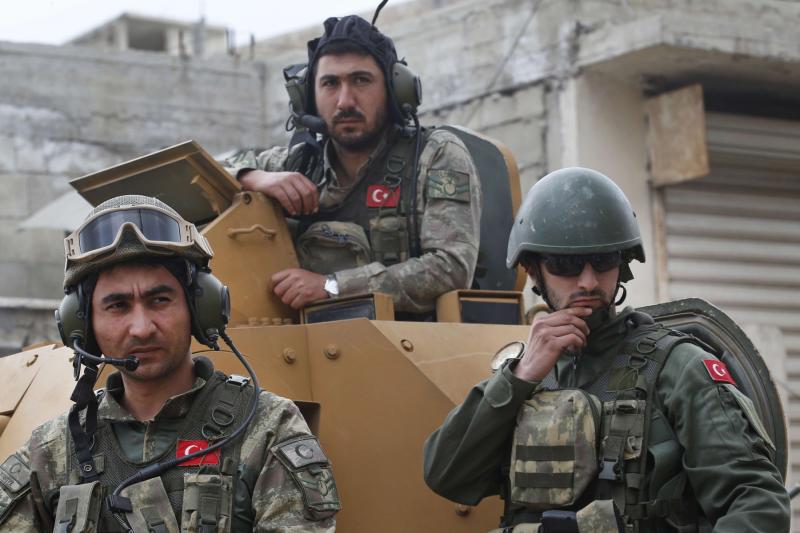Turkey eyes new Syria incursion after Idlib deal
ISTANBUL - Following an agreement with Russia to freeze plans for an assault on the Syrian rebel stronghold of Idlib, Turkey said it is preparing a new incursion into other parts of Syria.
“God willing, in the upcoming period, we will increase safe zones within Syria, also encompassing the eastern Euphrates,” Turkish President Recep Tayyip Erdogan said in a speech on the fringes of the UN General Assembly in New York. Addressing the assembly September 25, he said: “Our goal is to clear the Syrian territory, all the way from Manbij [on the Euphrates] to the Iraqi border, from terrorists.”
Turkey has established “safe zones” west of the river in the Jarabulus and Afrin areas of north-western Syria and secured a military presence in Idlib since 2016. In his remarks about a new intervention, Erdogan referred to a region held by a US-backed Kurdish militia, seen as a terrorist group by Ankara.
Pro-government media in Turkey said the Turkish military was planning attacks against Kurdish positions in Kobane, Tal Abyad, Ras al-Ayn and Qamishli. The pro-Erdogan Yeni Safak newspaper reported that the new “safe zone,” stretching east of the Euphrates to the Iraqi border, would reach 50-60km into Syria from Turkish territory.
Cross-border action in those regions would widen the Turkey-occupied area in Syria considerably but the area is part of an autonomous region claimed by the People’s Protection Units (YPG) militia, a key US ally in the fight against the Islamic State.
Ankara says it will not tolerate steps by the YPG, a Syrian affiliate of the Kurdistan Workers’ Party (PKK), regarded as a terrorist organisation by both Turkey and Washington, to establish a Kurdish-ruled zone in Syria. Erdogan has accused the United States of supporting the YPG with 19,000 truckloads and 3,000 planeloads of weapons.
Roland Popp, a security analyst in Zurich focusing on Middle Eastern affairs, said Erdogan was “both playing to domestic audiences as well as sending warning signals” to the United States with his statement about a possible new Syria operation. “The threat has to be taken seriously as Turkish troops have entered Syrian territory before,” Popp said via e-mail.
Turkey is unlikely to move troops across the border anytime soon, however, because that could provoke a military confrontation with US, French and Syrian troops in the region, Popp added. He said Erdogan’s statement might have been triggered by reports that the United States “has changed its overall strategy vis-a-vis the Syria conflict and is eyeing a long-term presence in the country.”
On the same day that Erdogan delivered his warning, US national security adviser John Bolton said US forces in Syria would stay “as long as Iranian troops” are there. The statement in effect cancelled an earlier promise by US President Donald Trump to withdraw the 2,000 US personnel as soon as possible.
Erdogan’s announcement came as Ankara struggled to disarm and remove thousands of rebels in Idlib before a mid-October deadline under the terms of a Russian-Turkish agreement to prevent a comprehensive assault on the Syrian province by government forces allied with Russia.
Turkey beefed up its military positions in Idlib as the clock ticked down. Complicating Turkey’s task, the Syrian Observatory for Human Rights monitoring group said the Syrian government had transferred hundreds of Islamic State fighters to the Idlib region from eastern Syria.
Moscow and Ankara agreed to set up a buffer zone in Idlib that is to be cleared of extremists but there is no sign of a withdrawal by jihadist organisations, such as Hayat Tahrir al-Sham (HTS), whose estimated 10,000 fighters control much of Idlib, before October 15, as stipulated by the Turkish-Russian deal.
“Removing these jihadist groups and heavy weaponry from this zone around Idlib is a difficult task that puts all the pressure on Ankara,” said Joe Macaron, a fellow at the Arab Centre in Washington. “Erdogan is betting on a deal with these groups that would prevent an offensive and retain some HTS influence but this might be a tall order,” Macaron wrote in an e-mail response to questions.
Not only HTS is proving to be a problem. A small hard-line jihadist faction in Idlib, Huras al-Din, rejected the agreement and urged rebels to begin new military operations. An alliance of Turkey-allied rebel groups, the National Front for Liberation (NFL), has declared its “complete cooperation” with the Turkish effort but ruled out disarming or yielding territory.
Erdogan told Reuters, in an interview published September 26, that the withdrawal of “radical groups” from Idlib had started but he did not say which groups were leaving or where they were going. Turkey says moderate rebels should be allowed to stay in the Idlib buffer zone.
As Ankara confronted the difficult task of plucking radicals from the buffer zone, Russia made it clear that the deadline stands. “By mid-October, all [HTS] fighters must leave this demilitarised zone and all heavy military equipment must be pulled out of there,” Foreign Minister Sergei Lavrov said.
“Erdogan had no option but to strike a deal with Putin on Idlib with tough preconditions from Moscow that are difficult to meet,” Macaron wrote. “Erdogan might have bought some time but Russia seems intent on moving forward with the Idlib offensive at some point.”
Thomas Seibert is an Arab Weekly contributor in Istanbul.
This article was originally published in The Arab Weekly.







